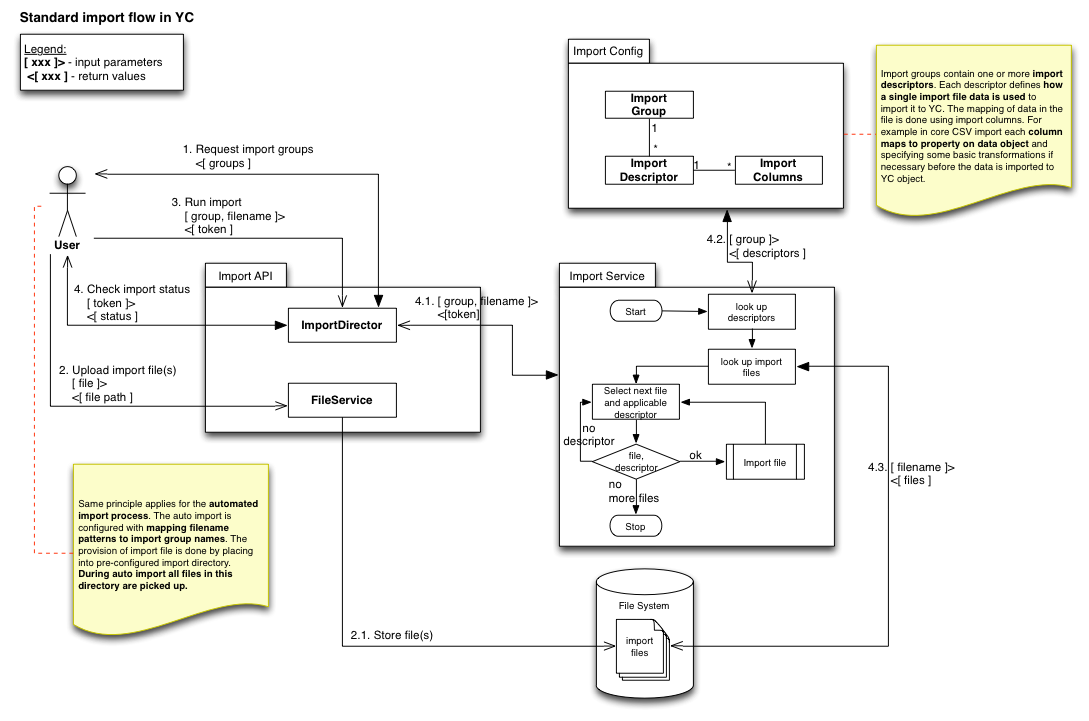Overview
Main components of the impex module are depicted in the diagram below. In both cases import and export the module relies on the local file system (or a shared drive) in order to consume or produce the files respectively.
This provides a simple self contained channel for all data. All additional connectivity such as FTP connections or web services integration that download/upload files to the external systems are not part of this module and should be encapsulated in other modules or by using the infrastructure capabilities.
For example in a typical flow where external PIM system expects to push data import file to an FTP location it is recommended to install and FTP server and then symlink the location to the incoming directory for auto import listener thereby reducing the complexity and improving the security as we do not need to store any credentials concerning FTP connection.
Import
Auto import job
Import is triggered via an autoImportJob which runs on a schedule defined in cron config.
The task expects a specific directory structure where data files are placed and a configuration file that allows it to trigger import using a specific import group.
The root of the directory structure is defined by a JOB_LOCAL_FILE_IMPORT_FS_ROOT system preference.
Expected directory structure within root:
ROOT |- SHOP10 | |- archived | |- config | | |- config.properties | |- incoming | |- processed | |- processing | |- SHOP20 | | ... | ...
The configuration file must contain:
- import group name, which should be used
- regular expression to match the filename in the incoming directory
- reindex flag to indicate whether to run full product re-index after successful completion
- credentials of the manager on which behalf the task should run
Example config:
config.0.group=YC DEMO: Initial Data config.0.regex=import\\.zip config.0.reindex=false config.0.user=admin@yes-cart.com config.0.pass=1234567 config.1.group=YC DEMO: IceCat Catalog config.1.regex=import\\-EN,DE,UK,RU\\.zip config.1.reindex=false config.1.user=admin@yes-cart.com config.1.pass=1234567 config.2.group=YC DEMO: Product images (IceCat) config.2.regex=import\\-EN,DE,UK,RU\\-img\\.zip config.2.reindex=true config.2.user=admin@yes-cart.com config.2.pass=1234567
Above config defines three import groups to import the demo data using admin@yes-cart.com account.
Configurable auto import job SaaS
Import is triggered via an autoImport2Job which runs on a schedule defined in cron config.
The difference compared to autoImportJob is that this task instead of scanning the configuration files and triggering corresponding imports simply invokes all active RawDataImporter services.
The importers are defined in java "properties" configuration style with importer ID pointing to system preference CODE that contains the properties for specific importer.
For example JOB_RAW_DATA_IMPORT_CONFIG may look like:
RAWIMPORTER1=JOB_RAW_DATA_RAWIMPORTER1 RAWIMPORTER2=JOB_RAW_DATA_RAWIMPORTER2 ... RAWIMPORTERN=JOB_RAW_DATA_RAWIMPORTERN
where RAWIMPORTER1, RAWIMPORTER2 ... RAWIMPORTERN corresponds to a RawDataImporter service ID as it is declared in the platform and JOB_RAW_DATA_RAWIMPORTERX is the system attribute value containing importer specific configurations.
Each raw data importer should be a self contained thread safe unit that is able to perform all its functions based on the configurations in the JOB_RAW_DATA_RAWIMPORTERX attribute that is mapped to it.
RawDataImporter can be defined in any custom module via configuration extension point.
Export
In order to define an export an additional task can be registered in custom module, which would contribute to the schedules extension point.
Generic export group processor SaaS
Generic export group processor is a generic implementation of a scheduled task that uses predefined export group to perform recurring export.
The task can be declared as following:
<!-- 1. Declare task that uses config-xxxxxx.properties -->
<bean id="xxxExport" class="org.yes.cart.bulkjob.cron.ConfiguredPausableProcessorWrapperImpl">
<property name="processor">
<bean class="org.yes.cart.bulkjob.impl.GenericExportGroupProcessorImpl">
<constructor-arg index="0" ref="bulkExportService"/>
<constructor-arg index="1" ref="ioProviderFactory"/>
<constructor-arg index="2" ref="authenticationManager"/>
<property name="configFile" value="config-xxxxxx.properties"/>
</bean>
</property>
<property name="systemService" ref="systemService"/>
<property name="pausePreferenceKey" value="JOB_XXXXX_PAUSE"/>
<property name="pausePreferenceDefault" value="false"/>
<property name="cfgContext">
<bean class="org.yes.cart.config.impl.ConfigurationContextImpl">
<property name="functionalArea" value="marketing"/>
<property name="name" value="xxxExport"/>
<property name="cfgInterface" value="Runnable"/>
<property name="cfgDefault" value="false"/>
<property name="properties">
<props>
<prop key="extension">Pausable cron job</prop>
<prop key="description">XXXX export job, configured in property file under export root (config-xxxxxx.properties)</prop>
<prop key="SYSTEM[JOB_XXXXX_PAUSE]">Pause</prop>
</props>
</property>
</bean>
</property>
</bean>
<!-- 2. Declare trigger -->
<bean name="xxxExportJob" class="org.springframework.scheduling.quartz.JobDetailFactoryBean">
<property name="jobClass" value="org.yes.cart.bulkjob.cron.YcCronJob" />
<property name="jobDataAsMap">
<map>
<entry key="jobName" value="xxx Auto Export" />
<entry key="job" value-ref="xxxExport" />
<entry key="nodeService" value-ref="nodeService" />
</map>
</property>
</bean>
<bean id="xxxExportJobCronTrigger" class="org.springframework.scheduling.quartz.CronTriggerFactoryBean">
<property name="jobDetail" ref="xxxExportJob" />
<property name="cronExpression" value="${admin.cron.xxxExportJob}" />
</bean>
<!-- 3. Register with extension -->
<bean id="xxxExportExtension" class="org.yes.cart.utils.spring.ArrayListBean">
<constructor-arg ref="managerCronScheduleTriggers"/>
<property name="extension">
<list>
<ref bean="xxxExportJobCronTrigger" />
</list>
</property>
</bean>
The config file should include:
- export group to trigger
- credentials for user to trigger it on behalf of
export.group=XXXX Group config.user=XXXX config.pass=XXXX
The export descriptor will specify the location where the file to be exported to:
<export-descriptor xmlns:xsi="http://www.w3.org/2001/XMLSchema-instance" xsi:noNamespaceSchemaLocation="http://www.yes-cart.org/schema/export-descriptor.xsd"> <context> <shop-code>XXX</shop-code> </context> <entity-type>org.yes.cart.domain.entity.Product</entity-type> <export-file-descriptor> <file-encoding>UTF-8</file-encoding> <file-name>/home/yc/server/share/resources/2l8YSRX1tTAQq8Ax0YbQIwqouYv3mdpq4I81m6vDMWtKED6jwY3orv5q5lY8vvfb_xxx_export.csv</file-name> <print-header>true</print-header> <column-delimiter>;</column-delimiter> <text-qualifier>"</text-qualifier> </export-file-descriptor> ...
The outcome of this configuration would be product export CSV file generated at the specified location on a cron schedule.
